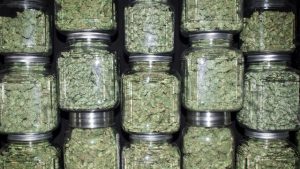 Mat Beren and his friends used to drive by the vast greenhouses of southern British Columbia and joke about how much weed they could grow there.
Mat Beren and his friends used to drive by the vast greenhouses of southern British Columbia and joke about how much weed they could grow there.
Years later, it’s no joke. The tomato and pepper plants that once filled some of those greenhouses have been replaced with a new cash crop: marijuana. Beren and other formerly illicit growers are helping cultivate it. The buyers no longer are unlawful dealers or dubious medical dispensaries; it’s the Canadian Government.
On October 17, Canada becomes the second and largest country with a legal national marijuana marketplace. Uruguay launched legal sales last year, after several years of planning.
It’s a profound social shift promised by Canadian Prime Minister Justin Trudeau and fuelled by a desire to bring the black market into a regulated, taxed system after nearly a century of prohibition.
It also stands in contrast to the United States, where the federal government outlaws marijuana while most states allow medical or recreational use for people 21 and older. Canada’s national approach has allowed for unfettered industry banking, inter-province shipments of cannabis, online ordering, postal delivery and billions of dollars in investment; national prohibition in the US has stifled greater industry expansion there.
Hannah Hetzer, who tracks international marijuana policy for the New York-based Drug Policy Alliance, called Canada’s move “extremely significant,” given that about 25 countries have already legalised the medical use of marijuana or decriminalised possession of small amounts of the drug. A few, including Mexico, have expressed an interest in regulating recreational use.
“It’s going to change the global debate on drug policy,” she said. “There’s no other country immediately considering legalising the nonmedical use of cannabis, but I think Canada will provide almost the permission for other countries to move forward.”
At least 109 legal pot shops are expected to open across the nation of 37 million people next Wednesday, with many more to come, according to an Associated Press survey of the provinces. For now, they’ll offer dried flower, capsules, tinctures and seeds, with sales of marijuana-infused foods and concentrates expected to begin next year.
The provinces are tasked with overseeing marijuana distribution. For some, including British Columbia and Alberta, that means buying cannabis from licensed producers, storing it in warehouses and then shipping it to retail shops and online customers. Others, like Newfoundland, are having growers ship directly to stores or through the mail.
Federal taxes will total $1 per gram or 10 per cent, whichever is more. The feds will keep one-fourth of that and return the rest to the provinces, which can add their own mark-ups. Consumers also will pay local sales taxes.
Some provinces have chosen to operate their own stores, like state-run liquor stores in the US, while others have OK’d private outlets. Most are letting residents grow up to four plants at home.
Canada’s most populous province, Ontario, won’t have any stores open until next April, after the new conservative Government scrapped a plan for state-owned stores in favour of privately run shops. Until then, the only legal option for Ontario residents will be mail delivery — a prospect that didn’t sit well with longtime pot fan Ryan Bose, 48, a Lyft driver.
“Potheads are notoriously very impatient. When they want their weed, they want their weed,” he said after buying a half-ounce at an illicit medical marijuana dispensary in Toronto. “Waiting one or two three days for it by mail, I’m not sure how many will want to do that.”
British Columbia, home of the “BC Bud” long cherished by American pot connoisseurs, has had a prevalent marijuana culture since the 1970s, after US draft-dodgers from the Vietnam War settled on Vancouver Island and in the province’s southeastern mountains. But a change in Government last year slowed cannabis distribution plans there, too, and it will have just one store ready next Wednesday: a state-run shop in Kamloops, a few hours’ drive northeast of Vancouver. By contrast, Alberta expects to open 17 next week and 250 within a year.
There is no immediate crackdown expected for the dozens of illicit-but-tolerated medical marijuana dispensaries operating in British Columbia, though officials eventually plan to close any without a licence. Many are expected to apply for private retail licences, and some have sued, saying they have a right to remain open.
British Columbia’s ministry of public safety is forming a team of 44 inspectors to root out unlawful operations, seize product and issue fines. They’ll have responsibility for a province of 4.7 million people and an area twice as large as California, where the black market still dwarfs the legal market that arrived in January.
Chris Clay, a longtime Canadian medical marijuana activist, runs Warmland Centre dispensary in an old shopping mall in Mill Bay, on Vancouver Island. He is closing the store Monday until he gets a licence as he feared continuing to operate post-legalisation would jeopardise his chances. Some of his eight staff members will likely have to file for unemployment benefits in the meantime.
The federal Government has licensed 120 growers, some of them enormous. Canopy Growth, which recently received an investment of $4 billion from Constellation Brands, whose holdings include Corona beer, Robert Mondavi wines and Black Velvet whiskey, is approved for 5.6 million square feet (520,000 square meters) of production space across Canada. Its two biggest greenhouses are near the US border in British Columbia.
